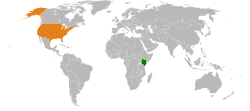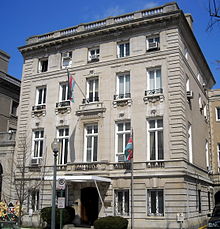Kenya–United States relations
 | |
Kenya |
United States |
|---|---|
| Diplomatic mission | |
| Kenyan Embassy, Washington, D.C. | United States Embassy, Nairobi |
Kenya–United States relations are bilateral relations between Kenya and the United States. The United States and Kenya have long been close allies and have enjoyed cordial relations since Kenya's independence. Relations became even closer after Kenya's democratic transition of 2002 and subsequent improvements in human rights.
This was preceded by sometimes frosty interludes during President Moi's regime when the two countries often clashed over bad governance issues, resulting in aid suspension and many diplomatic rows. Following the election of the new government of Uhuru Kenyatta in 2013, relations somewhat took a dip when the new president forged a new foreign policy looking east away from traditional western allies. US - Kenyan relations have been cemented through cooperation against Islamist terrorism and a visit by President Obama to Kenya, which is the homeland of his father.
Kenya's athletic mastery of some auspicious American events such as the Boston Marathon and New York Marathon have increased ordinary Americans' consciousness of Kenya paving the way for a warm mutual regard between the two peoples. An attack on Kenya by Al-Qaeda in 1998 as well as subsequent more attacks by Al-Shabaab , has drawn the two countries politically closer due to the shared fate the US has had of similar targeting in the horrific September 11 attacks by al Qaeda in lower Manhattan and The Pentagon.
Kenya is one of the most pro-American nations in Africa and the world, seemingly more so than the U.S. itself. According to the Pew Research Global Attitudes Project, 87% of Kenyans view the U.S. favorably in 2007, decreasing slightly down to 83% in 2011 and 81% viewing the U.S. favorably in 2013.[1] and according to the 2012 U.S. Global Leadership Report, 68% of Kenyans approve of U.S. leadership, with 14% disapproving and 18% uncertain.[2] In a 2013 BBC World Service poll, 69% of Kenyans view U.S. influence positively, with only 11% viewing U.S. influence negatively.[3]
History
After Kenya's independence on 12 December 1963, the United States immediately recognized the new nation and moved to establish diplomatic relations. The embassy in Nairobi was established 12 December 1963—Kenya's independence day—with Laurence C. Vass as chargé d'affaires ad interim pending the appointment of an ambassador. Kenya charted a political path that was capitalist, aligning itself to the West making it a key American ally in the region during the Cold War .
More than 9,000 U.S. citizens are registered with the U.S. Embassy as residents of Kenya. In 2006 a record 86,528 Americans visited Kenya, up 17.6% from 2005. About two-thirds of resident Americans are missionaries and their families. U.S. business investment is estimated to be more than $285 million, primarily in commerce, light manufacturing, and the tourism industry.
Al Qaeda terrorists bombed the U.S. Embassy in Nairobi on 7 August 1998, killing more than 200 and wounding thousands. Since that event, the Kenyan and U.S. Governments have intensified cooperation to address all forms of insecurity in Kenya, including terrorism. Families and victims of the attack have severally appealed to the Kenyan government to petition the U.S. government to compensate them. A Kenyan journalist who resides in the US has on several occasions castigated the US government for its nonchalant approach to the issue. In an article titled "The Big Bloody Burden of The Big Brother" published by the Daily Nation, one of the two mainstream Kenyan Newspapers, the writer, Ben Mutua Jonathan Muriithi wondered why "the Obama administration and others before it had turned a blind eye yet it was clear that Kenya had suffered as a Collateral damage".
The United States provides equipment and training to Kenyan security forces, both civilian and military. In its dialog with the Kenyan Government, the United States urges effective action against corruption and insecurity as the two greatest impediments to Kenya achieving sustained, rapid economic growth.[4]

U.S. assistance to Kenya is substantial.[5] It promotes broad-based economic development as the basis for continued progress in political, social, and related areas of national life. The U.S. assistance strategy is built around five broad objectives: Fighting disease and improving healthcare; fighting poverty and promoting private sector-led prosperity; advancing shared democratic values, human rights, and good governance; cooperating to fight insecurity and terrorism; and collaborating to foster peace and stability in East Africa. The Peace Corps, which has 150 volunteers in Kenya, is integral to the overall U.S. assistance strategy in Kenya.
Principal U.S. Officials include:
- Ambassador—Robert F. Godec since January, 2013
- Deputy Chief of Mission—Pamela Slutz
- USAID Mission Director—Erna Kerst
- Public Affairs Officer—T.J. Dowling
The U.S. Embassy in Kenya is located on UN Avenue, Nairobi, P.O. Box 606, Village Market, Nairobi.

U.S. assistance to Kenya grew "exponentially" during the administration of President Barack Obama, as the U.S. Agency for International Development (USAID) put it in a 2012 contracting document reported by the independent, investigative blog U.S. Trade & Aid Monitor. The number of USAID projects had grown significantly enough for the agency to justify hiring additional contractors to help it manage its Kenyan program portfolio. A Statement of Work for the support initiative acknowledged that "the level of U.S.-financed Kenyan operations has outpaced Washington's ability to adequately manage it."[6]
USAID months later issued a solicitation seeking private-sector help in carrying out an information-dissemination project aimed at swaying public opinion on U.S. "investments" in Kenya. The USAID/Kenya Strategic Communications Plan 2012–2013 explicitly laid out the Obama Administration's plan to "groom" journalists worldwide to encourage favorable reporting of U.S. assistance efforts. The strategic plan explicitly named particular journalists for targeting, encouraging potential contractors to "Engage a few key international journalists, such as the Economist's Africa Baobab blog, the Washington Post's [Africa Bureau Chief] Sudarsan Raghavan, the New York Times [East Africa Bureau Chief] Jeffrey Gettleman and AP's [Kenya correspondent] Jason Straziuso in following our progress on targeted issues." Similarly it calls for developing relationships with Kenyan media personalities including "bloggers such as Bankelele, The Young Agropreneur, Kenyanfarmer and DJs of popular radio programs such as DJ Prince of Ghetto Radio, Cess and Maqbul on Capital FM."[7]
Following the U.S. Trade & Aid Monitor report on this media targeting, however, USAID swiftly pulled the USAID/Kenya Strategic Communications Plan 2012–2013 from public view. The agency initially made the document available via the Federal Business Opportunities database, but soon after removed it, claiming that its posting of the document was accidental, intended "'for internal purposes only.'"[8]
Recent issues
Early in 2013, the Obama Administration via the U.S. Agency for International Development issued a Request for Proposals seeking contractor assistance in encouraging peace between warring tribes and cattle-raiders in and around Kenya.
The PEACE III initiative proposes, among other approaches, to arrange "reflective workshops" among groups in conflict primarily along Kenyan border regions, where such groups would share "trauma stories" as a means of reconsidering who is a "victim" and who is a "perpetrator."
According to U.S. Trade & Aid Monitor, the administration "acknowledges that chronic cattle rustling and other cultural practices – such as killing rivals “to prove their manhood or impress young women” – serve as impediments to progress."
Visits
Secretary of State Hillary Clinton visited Nairobi in 2009 and 2012[9] and Secretary of State John Kerry also visited in 2015.[10]
Vice President Joe Biden visited Nairobi in 2010.[11]
President Barack Obama, whose father is a Kenyan native, became the first U.S. President to visit Kenya when he visited Nairobi in 2015[12] where he co-hosted the Global Entrepreneurship Summit 2015 with President Uhuru Kenyatta. Uhuru Kenyatta has visited the US on several occasions[13] whilst president. Former presidents Daniel Moi and Mwai Kibaki also visited the US on several occasions.[14]
Gallery
-
Daniel arap Moi, Kenya's second President, and George W. Bush.
-
Robinson Njeru Githae, Kenya's current ambassador to the US.
-
President Uhuru Kenyatta, with the Obamas.
See also
References
![]() This article incorporates public domain material from U.S. Bilateral Relations Fact Sheets. United States Department of State.[7]
This article incorporates public domain material from U.S. Bilateral Relations Fact Sheets. United States Department of State.[7]
- ^ Opinion of the United States
- ^ U.S. Global Leadership Project Report - 2012 Gallup
- ^ Country Ratings - 2013 BBC Poll
- ^ "United States Aid to Kenya: Regional Security and Counterterrorism before and after 9/11".
- ^ Kenya and the Global War on Terror African Journal of Criminology and Justice Studies; Samuel L. Aronson
- ^ "Obama's Spending Grows 'Exponentially' in Kenya".
- ^ "White House Rolls Out Kenya Propaganda Plan".
- ^ "COVER-UP! Contracting System Sanitized of Kenya Documents".
- ^ [1]. Group pushes US focus on Kenya reforms. Retrieved on 31 July 2015.
- ^ [2]. Secretary of State John Kerry Remarks in Nairobi, Kenya. Retrieved on 31 July 2015.
- ^ [3]. Biden lands in Nairobi. Retrieved on 31 July 2015.
- ^ [4]. Nairobi returns to normal after Barack Obama's visit. Retrieved on 31 July 2015.
- ^ [5]. Seeing off President Uhuru Kenyatta who will be attending the US-Africa Leaders Summit in Washington. Retrieved on 31 July 2015.
- ^ [6]. President Bush Welcomes President Kibaki of Kenya to White House . Retrieved on 31 July 2015.
External links
- History of Kenya – U.S. relations
- Foreign Aid Explorer - Searchable details of U.S. Foreign Aid
![]() Media related to Kenya – United States relations at Wikimedia Commons
Media related to Kenya – United States relations at Wikimedia Commons




